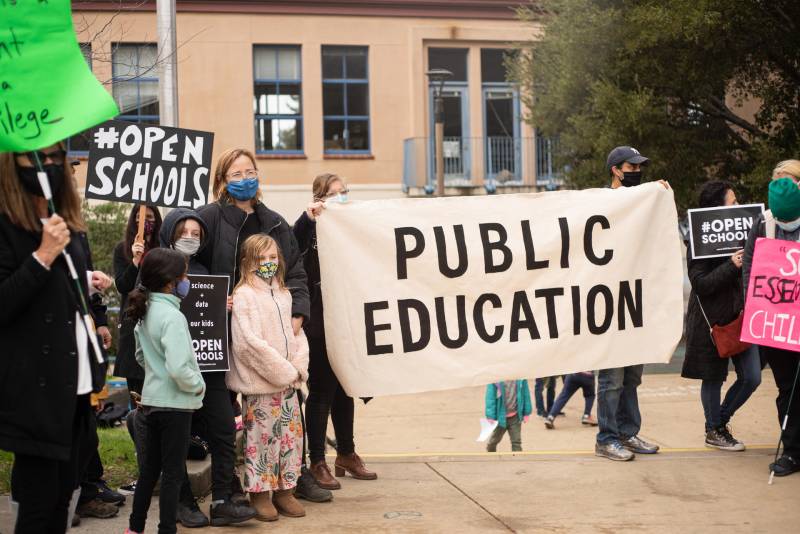Pressure has been building on teacher unions still in negotiations with their districts to come to an agreement that would allow students to return to in-person learning on campuses. But union officials have pushed back. Susan Solomon, executive vice president of the United Teachers of San Francisco, said on KQED’s Forum this week that the newly formed parent group does not speak for all parents. She pointed to a survey of San Francisco Unified School District families that found relatively more Black and brown parents reporting they do not feel safe sending their children back into classrooms.
In the West Contra Costa Unified School District, where COVID-19 has hit families hard, 35% of parents surveyed by the district want to remain in distance learning, with just 15% saying they want to return their children to in-person classes. Others said their decision will depend on vaccination levels and the number of community cases. The results point to the need to be careful about which parental voices are being amplified in this debate and which aren’t, says United Teachers of Richmond President Marissa Glidden.
“It’s very clear to us that families that are most impacted by COVID, who have had to suffer through deaths and really close interactions, or suffered through it with their own families, are much more hesitant to return to school,” Glidden said. “And those are predominantly families of color.”
In Oakland, Pecolia Manigo, parent of three OUSD students and executive director of the Bay Area Parent Action Leadership Network, says although her children would definitely benefit from getting back into school at Manzanita SEED Elementary, she doesn’t feel it is safe to send them.
“We’ve had a mom that died at SEED due to complications, in my daughter’s class,” she said. “So, I think that changes your perspective around how this virus functions and moves.
She said the school, whose students are 67% Latinx and 10% Black, is close to “one of the hottest” neighborhoods in Oakland” when it comes to coronavirus cases.
“And so there’s just a higher level of transmission at this point in that particular zip code,” she said. “And that is also the zip code where a lot of families live right from our school community. And so so that changes my understanding of the risk.”
Manigo, who is Black, has talked with parents who are pushing for schools to reopen and says they aren’t feeling the effects of the pandemic in the same way families in her neighborhood are.
“It’s not in their families, is not in their neighborhood. It’s an amorphous kind of idea and a threat. It’s not even seen as a potential threat for them,” she said. “We are hearing families testing positive every week. And so it just feels different for us.”
In cities that have not seen concentrations of COVID-19 in residential neighborhoods, such as Berkeley, some parents of color have advocated for a return to in-person learning. Berkeley Unified parent Laura Babitt, who is Black and newly elected to the school board, recently wrote to the Berkeley City Council expressing parents’ frustration.
“While science says we can do this safely, the unions are asking for more,” she wrote. “So much more, that we may never be able to reopen schools for our earliest learners.”
Bacigalupi, from Open Schools California, says her son, who has dyslexia, is one of the students falling behind in distance learning. She points to data gathered by the national group Parents Together Action, which shows parents from low-income homes are 10 times more likely to say their kids are doing little to no remote learning since school has been closed.
“So to critics who question our intentions, I would say how is it not a progressive value to want your children to be educated in school?” Bacigalupi said. “How is speaking up for kids suddenly so controversial?”
Open Schools California wants all parents to have a choice, Bacigalup says, but it doesn’t want kids to fall further behind.
Some districts, like Napa Valley Unified, are, indeed, offering parents a choice. The district of 17,000 students reopened in October with a hybrid schedule. At that time, about half the district’s parents were sending their children into school for classes twice a week while the other half remained in distance learning.

